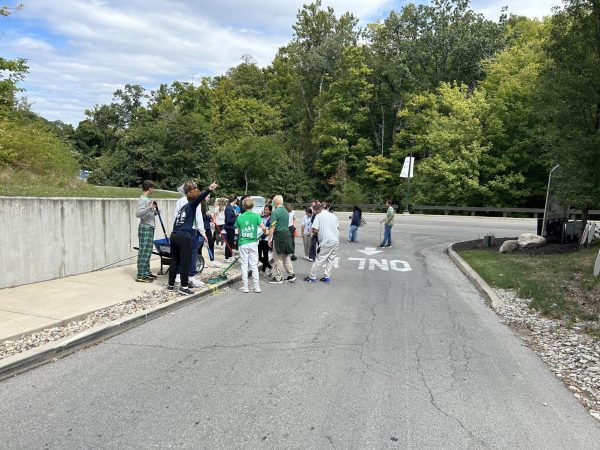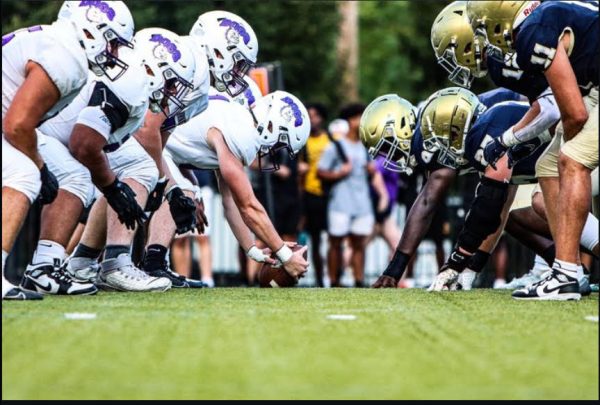Principal, task forces make back-to-school plans
Wearing masks, bringing your own lunch among new guidelines
Principal Mrs. Julie Barthel.
When it comes to plans to resume classes in August, Principal Mrs. Julie Barthel follows three guiding questions: How can we get back together, be the safest school in Indiana and get done what we need to do to achieve our mission?
Changes are in the works to ensure a safe return to campus for both students and educators. As a part of the back to school plan, students and teachers will wear masks while on campus, including in classrooms.
Students will receive their own cloth masks branded with the school logo. The Indiana Department of Education also issued the school free paper masks, which will serve as backups. Since masks are now considered a part of the dress code, decisions are being made on whether to allow students to wear their own masks.
While administrators and teachers will do their part to ensure a safe environment, parents and students will be expected to do the same.
Checking temperatures at home
Families will take on new responsibilities. At home, students will be asked take their temperature every morning. The school will request those with fever or illness to stay home. Students have to self-quarantine for 10 days before returning to school when afflicted with a non-COVID related illness and 14 days with COVID-19. In the past, there were consequences for a certain number of missed school days each semester, but this new policy calls for updates in the attendance system, Barthel said.
If a student recovers before their mandatory quarantine ends, they will be able to partake in eLearning similar to what they would learn in-person by watching class live streams or recordings. This also applies to students who may feel uncomfortable attending school due to their own health of that of others in their household. Barthel said, “If a kid were at home, it wouldn’t be eLearning like it would be a separate assignment. Hopefully, it will just be eLearning that they’ll be seeing what’s going on in the classroom and can follow along.”
Classes on campus will also undergo adjustments. Barthel said large groups would be split whenever there was an opportunity to do so, but since it might be unsafe for the school’s substitute teachers, many of whom are older, administrators and other teachers will be expected to step up to cover the additional classes. The school encourages outdoor instruction, which will most likely take place on the school’s sports fields, when possible. Due to construction of the Innovation Center, the courtyard between Kelly and Loretto halls is no longer an option.
Barthel also noted that research shows that signing spreads the virus, and that some outbreaks have occurred in church choirs. Therefore, a second choir teacher has been hired in order to divide choirs into smaller groups.
That mass of students lined up to get into Kelly or Loretto for their next class? That also is being addressed. Teachers will release students in waves, though the schedule will need to adapted to allow staggered times. More information on the schedule will be available after July 4, the principal said.
Eating lunch in classrooms
To prevent large numbers of people gathering in the cafeteria, students will eat lunch in classrooms. The school will provide a limited amount of pre-packaged food, but for the most part, students must bring meals from home. No one may share food, utensils or condiments. Barthel said additional trash cans will be put in rooms for lunch waste and janitors will assist with disposal.
Custodians will also take on more tasks related to sanitization. Federal funding from the CARES Act gives schools extra money for cleaning supplies and even personnel. With these grants, the school will hire janitors to work on disinfection and cleaning in places like Loretto Hall, where previously there was no one assigned during the school day, so no cleaning of public areas or bathrooms took place between 7:50 a.m. and 3:10 p.m., Barthel said.
CARES funding also allows more money to be invested for both physical and mental health. The school is considering hiring a second nurse from the Community Health Network who would specifically deal with COVID-infected students. Schools across the state have received advice to double their counseling and emotional support. “(We’ve) been working with our mental health counselor as far as supporting adults and students,” Barthel said.
COVID-19 resulted in the cancellation of many events last spring, including the musical, prom and the Irish 500. According to Barthel, nothing in the upcoming school year has been postponed as of late June. In fact, construction on the Innovation Center began ahead of schedule, meaning that at the beginning of the year, the bookstore will open in a new location in what was the B basement math hallway.
Special circumstances, like field trips, will experience safety tweaks. Virtual field trips will be the norm until travel becomes safer, the principal said.
Allowing shadow visits
Shadow days will still happen in person, but cautiously. Like students, shadows must take their temperature before coming to school and stay home if they have a fever or feel sick. Phone numbers will be kept for contact tracing purposes. Barthel said that she and the admissions team are looking at other schools’ practices to develop their own.
Through the pandemic, Barthel isn’t working alone. Her team includes safety, academic and financial task forces, including a member of the Indiana Department of Education take force, Dr. Lindsay Weaver, whose daughter is a rising freshman.
Barthel said, “We’ve said we’ve been working harder than we ever have in our careers, you know, because we do feel like we’re making these decisions for 1,400 people.”

Julia Hurley is a freshman and a reporter for the Megaphone. At Cathedral, she sings in the concert choir and plans to participate in theater. In her free...







